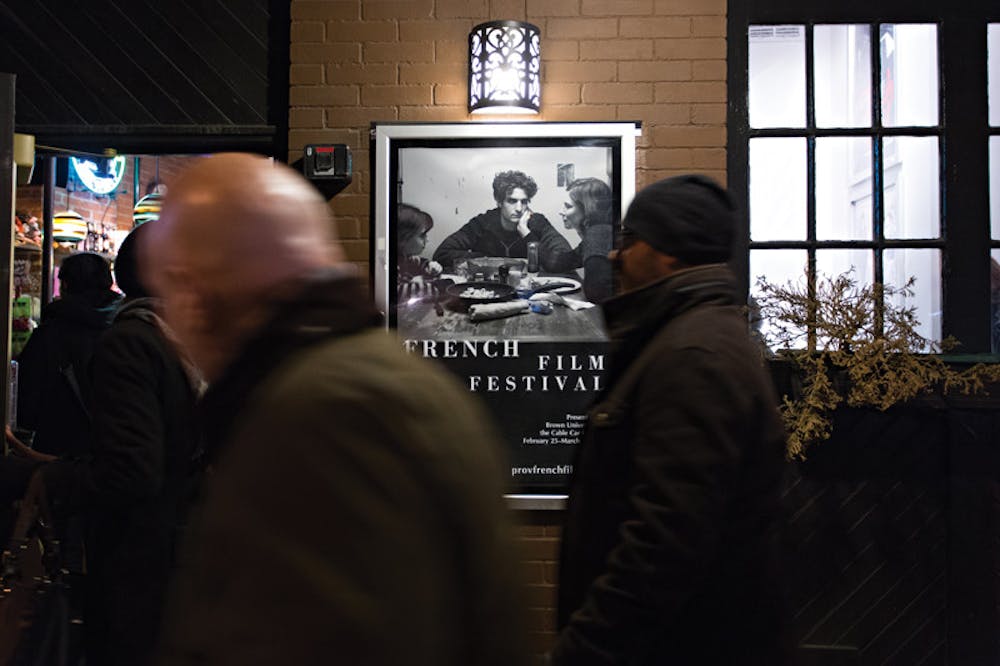“It’s a really good first date opportunity,” said Stephen Crocker ’05.5, University multimedia production manager, of the Providence French Film Festival running at the Cable Car Cinema until Tuesday. “The woman that I’m going to marry this June — it was our first date six years ago.”
Though the festival debuted at the Cable Car almost two decades ago as a Department of Modern Culture and Media project, it has blossomed into a joint initiative between MCM and the Department of French Studies, Crocker said.
French studies faculty members help select the films, and several French studies courses require students to attend screenings said Stéphanie Ravillon, lecturer in French studies. Students enrolled in MCM and French studies courses volunteer for the festival, checking tickets at the door and putting up posters around Providence, Ravillon added.
The festival, which began Wednesday, allows students studying French to use their language skills outside of the classroom, Ravillon said. The event marks a substantial opportunity for cultural exposure, as few French films make their way across the Atlantic, she said.
The screenings also “bridge the gap between Brown and the Providence community,” as many locals come to the festival to get their French fix, Ravillon added.
Crocker, who lives on the West Side of Providence, said locals and students alike can revel in the relief cinema provides from the daily grind of a Providence winter — the festival occurs at a time when the city is particularly dreary.
Screened Wednesday on a frigid February evening, “Jealousy,” directed by Philippe Garrel, offered audience members little respite from the cold. The film is icy and bleak, in mise en scene as well as in mood. Louis, the protagonist, puts an end to his marriage in the first scene without much in the way of emotion or explanation. The rest of the work centers on his uneasy rapport with Claudia, who shares his profession of acting as well as his penchant for polyamory.
The camera often lingers on the characters’ black-and-white visages, delving deeply into faces that betray frustration and disappointment but rarely break down into red-hot histrionics. A couple of arguments arise and bouts of tears burst onto screen, but these are ephemeral points of divergence in a plot that is relentlessly committed to a cool aesthetic and a realist dilemma: infusing excitement into an ordinary relationship.
Louis and Claudia’s bond is rife with worry, as both fret about their own intentions and those of the other. Toward the start of their time living together, Claudia suddenly and inexplicably rushes from the street to their apartment, bounding up the stairs of their building. Upon seeing Louis, she leaps into bed beside him and, clutching onto his arm with both hands as though holding on for dear life, she whispers in between gasps for air, “I thought you’d gone.” Bewildered, he asks, “Where did you want me to go?”
Ironically, it is she who cheats first, proving that jealousy works in more ways than one. Claudia, who has not scored an acting gig in six years, begrudges Louis his continual success in theater. Envy eventually drives her to trade in a night at the apartment for one at the bar, and she hooks up with a stranger. The one-night stand signals a turning point, as Claudia seems content thereafter to accept that she cannot make monogamy work.
Louis, on the other hand, says he is in it for the long haul. “I love you for what you are and what you think,” Louis says to Claudia. “I love you, and it’s definitive.” But his words ring laughably false. We know — even if Claudia does not — that he is speaking to himself more than to her, trying to solidify shaky sentiments by uttering them aloud. The exchange also works as comic irony, because — unbeknownst to Claudia — the preceding scene features Louis struggling to wrest himself away from a woman whom he kissed with much more conviction than his words to Claudia exhibit.
Thus the obvious contradiction in their convictions: Claudia silently resigns herself to infidelity while Louis fights the urge to engage in it. Yet the defining dilemma in Garrel’s film is not the disparity between the stated desires of the characters he canvasses so vividly. Rather, Louis and Claudia both confront the chasm between their stated preferences and their true wishes. While they claim to stand at either end of a spectrum that ranges from dutiful monogamy to carefree infidelity, both lovers really rest somewhere in between. This inability to accept ambivalence is the key to the tragedy in “Jealousy,” but it is also central to the intellectual musing that makes the work enthralling.





